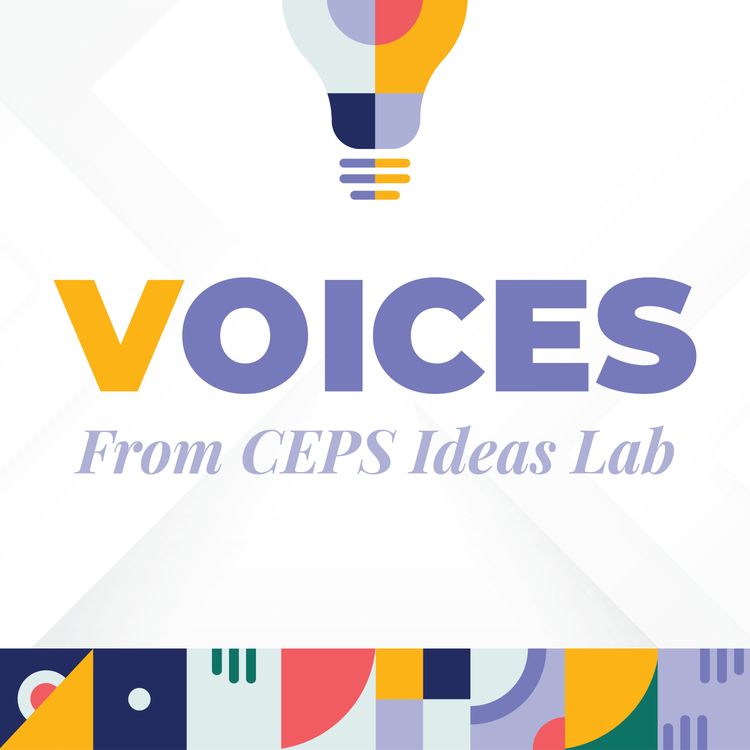Share

Voices from CEPS Ideas Lab
7. Insights from the 2025 Ideas Lab ft. Andrea Renda
The CEPS Ideas Lab is the largest policy event by an Independent Think Tank in Brussels. The objective of Ideas Lab is to provide a high-level intellectual forum for exchanges concerning a wide range of current and pressing issues faced by the EU. The discussions are open, insightful and impactful, with the active involvement of policymakers, researchers and representatives from industries and civil society. This year, stakeholders came together to discuss current challenges Europe is facing such as the war in Ukraine, pending trade tariffs, rising security threats and Europe´s need to become more competitive and catch up in tech innovation. Europe has the potential to lead in key areas, but it will take an ambitious and coordinated effort to achieve this outcome.
In this episode our host, Tom Parker, is joined by Andrea Renda, Director of Research at CEPS, to discuss the importance of collaboration among European innovation hubs, the need for a unified strategy, and the recent shift in policy towards European competitiveness, sovereignty, and security.
For further reading on Andrea Renda’s work and CEPS’ policy research, follow this link.
Watch this episode here
More episodes
View all episodes

33. Does GDPR need to be reformed? ft. Paula Gürtler
07:27||Season 1, Ep. 33The EU’s General Data Protection Regulation (GDPR) was designed to protect privacy and personal data, but its enforcement has been rather lacking across Member States. Some argue that it no longer fully delivers on its original ambitions whereas others denounce it unnecessarily burdens SMEs with regulation. Our host, Tom Parker, is joined by Paula Gurtler, Associate Researcher in the Global Governance, Regulation, Innovation and Digital Economy (GRID) unit at CEPS. Her work focuses on Applied Ethics and in particular the ethics of new technology. Together, they talk potential reforms, the need for agility in data regulation, and how GDPR interacts with newer legislative frameworks such as the Data Act. For more information on Paula Reiners and the work of CEPS, visit this link. Watch this episode here
32. 32. On women’s health and its challenges ft. Cosima Lenz
07:49||Season 1, Ep. 32Women’s health includes well-being across all life stages and while reproductive health is often the focus, there are many overlooked areas such as mental health or diseases prevention that require attention. Greater investment in these often-overlooked areas of research could yield social but also economic benefits worldwide. Our host, Tom Parker, is joined by Cosima Lenz, associate researcher in the Global Governance, Regulation, Innovation and Digital Economy (GRID) Unit, specializing in global health policy. Together they discuss the economic benefits of investing in women’s health, and how policy shifts can help close gaps in research and healthcare access. For more information on Cosima Lenz and her work at CEPS, visit this link. Watch this episode here
31. 31. Does Europe need a climate bad bank? ft. Nicole Reynolds
09:54||Season 1, Ep. 31The EU is going to miss its target of net-zero emissions by 2050 unless it greatly accelerates the transition to a sustainable economy. A climate bad bank is a tool the EU could use in order to smooth out the transition by directing investment to green sectors from carbon intensive industries while also providing financial stability. Our host is joined by Nicole Reynolds, Associate Research Fellow at CEPS, her work centres around policy issues in AI, sustainability, climate and development finance. They explore the importance of EU competitiveness and the need for financial guarantees to attract investment. For more information on sustainable finance and EU policies, visit this link. Watch this episode here
30. 30. How can European pension funds be leveraged to fund Europe’s industry? ft. Apostolos Thomadakis
06:47||Season 1, Ep. 30Pension funds play an important role as institutional investors in financing Europe's key sectors. However, their current use is limited, especially compared to more liberalised markets as the U.S. Leveraging these funds is key to give European start-ups and innovators the financial boost they need to compete globally Our host, Tom Parker, is joined by Apostolos Thomadakis, Head of research at the European Capital Markets Institute (ECMI), an independent research institute run by CEPS’ Financial Markets and Institutions Unit. Both will discuss how Europe can encourage pension funds to invest in high-growth sectors like AI, clean energy, and digital infrastructure. For more information on Apostolos Thomadakis and the work of CEPS, visit this link. Watch this episode here
29. 29. Europe and Global Health Diplomacy ft. Louise Bengtsson
11:06||Season 1, Ep. 29Health diplomacy is undergoing significant transformations. Traditional approaches are being challenged, and we are far from reaching the health goals of the Agenda 2030. Geopolitical uncertainty has undermined the traditional multilateral initiatives, while new international donors and regional organisations are playing an increasingly important role in Global Health Diplomacy. Our host is joined by Louise Bengtsson, Associate Research Fellow at CEPS in the Global Governance, Regulation, Innovation and Digital Economy (GRID) Unit at CEPS. Her research focuses on the EU institutions and the EU’s role in global health. Together, they discuss how the EU navigates the new health diplomacy landscape, and the consequences of political decisions on Global Health systems. For more information on Louise Bengtsson and the work of CEPS, visit this link. Watch this episode here
28. 28. How can Europe's industrial strategy integrate agricultural innovation and sustainability? ft. David Zilberman
13:27||Season 1, Ep. 28Reaching Europe’s sustainability and industrial goals requires a stronger bioeconomy. Agriculture is evolving beyond food production, contributing to biofuels, pharmaceuticals, and materials that could replace traditional industrial inputs like cement. However, Europe’s strict regulations, particularly on GMOs, are seen as barriers to innovation. How can Europe remain competitive while maintaining strict environmental regulations? Our host, Tom Parker, is joined by David Zilbermann, Professor at the University of California, Berkeley, to explore these challenges and opportunities. They discuss the role of genetic engineering in European agriculture and the need for regulatory reform to balance risk with innovation. For more information on David Zilberman and his work, visit this link. Watch this episode here
27. 27. Why the far-right can no longer be considered as a minor player in Europe ft. Sophia Russack
11:17||Season 1, Ep. 27Today in Europe, far-right parties are playing a prominent role whether we like it or not, as partners of broader coalitions and even as leaders in some cases. As a result, political forces must coexist with this new player and find ways of limiting its influence. Our host Tom Parker is joined by Sophia Russack, Researcher at CEPS in the Institutions unit. Together, they discuss the growing significance of the far-right in Europe, explore the factors that have contributed to its rise, and consider potential measures to protect Europe from this form of extremism. For more information on Sophia Russack and the work of CEPS, visit this link. Watch this episode here
26. 26. Discussing a CERN for AI ft. Maria Leptin
10:48||Season 1, Ep. 26Funding, infrastructure and fundamental research are all areas in need of focus if we want to discover the next big thing and, maybe more importantly, attract the right people capable of doing it. The European Research Council has taken steps into ensuring the continent remains a welcoming ecosystem for researchers and investigation on the global stage. Our host Tom Parker is joined by Maria Leptin, president of the European Research Council. Together, they will discuss if a “CERN for AI” to support AI innovation is the right move to remain attractive in the field. For more information on Maria Leptin and the work of the ERC, visit this link. Watch this episode here
25. 25. Is Europe protecting migrant’s rights? Ft. Sergio Carrera
12:11||Season 1, Ep. 25Migration has become a highly politicised area of discussion in the last decade with the refugee crisis, illegal migration and more recently Ukraine refugees. With so much movement within the European continent the EU institutions have the duty to enforce the law upon Member States and ensure migrants’ rights are respected, which is not always the case. Our host Tom Parker is joined by Sergio Carrera, senior research fellow at CEPS and Head of Justice and Home Affairs unit. Together, they will discuss migration, fundamental rights and the dangerous consequences of failing to enforce the law for the future of Europe. For more information on Sergio Carrera and CEPS check this link. Watch this episode here